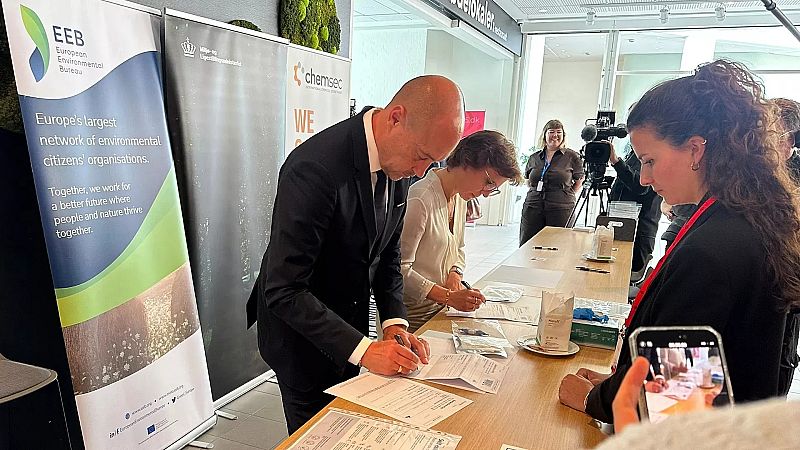EU ministers test positive for PFAS in their blood, despite forever chemical phase-outs

PFAS are harmful ‘forever chemicals’ that have been linked to cancer and other serious health risks.
This summer, the Danish Ministry of Environment and Gender Equality, together with the European Environmental Bureau (EEB) and ChemSec, invited European ministers to test their blood for PFAS. The results, recently published, demonstrate the widespread contamination of these substances.
“No one is immune” to exposure to forever chemicals
24 leaders, across 19 countries, participated in the initiative. The study focused on 13 specific PFAS substances that are known to infiltrate the human body and environment.
The results show that PFAS contaminated the blood of all of the top politicians tested. For half of these EU leaders, contamination reached a level which could indicate an increased risk of adverse health effects. Six of the detected PFAS are already regulated, indicating that the impacts of such forever chemicals are long-lasting.
"It is dramatic to see that, despite existing bans, PFAS are still present in our blood,” says Jean-Luc Crucke, Belgian Minister of Mobility, Climate, and Environmental Transition, in charge of Sustainable Development. “This shows that these ‘forever chemicals’ are not only a legacy of the past, but an ongoing threat to our health and environment.”
How do PFAS affect human health?
Polyfluoroalkyl substances (PFAS) are a group of over 10,000 chemicals that are used widely across industries. Their unique chemical structure makes them remarkably resistant, creating surfaces that are nonstick, stain-resistant, or water-repellent.
But because of their resistance capabilities, they don’t break down easily and can linger in the environment long after their use.
These chemicals can contaminate humans through drinking water, food, and the use of consumer products. Recent research has also shown that these chemicals can enter the human body through skin contact.
Additionally, people who work in specific industries are at high risk of contamination. For instance, firefighters are often exposed to the chemicals in their foam, though the European Commission recently adopted new measures to restrict their use.
PFAS exposure in humans has been linked with various health issues such as cancer, high cholesterol, and fertility.
How can you reduce exposure to PFAS?
There are various measures individuals can take to reduce exposure in their day-to-day lives, opting for PFAS-free cosmetics, food packaging, and waterproof fabrics.
As part of the initiative, the European Environment Bureau, ChemSec and more than 100 organisations across Europe launched the Stop PFAS manifesto, urging EU leaders to act by supporting the universal PFAS restriction.
The group estimates that cleaning up existing contamination could cost the EU up to €2 trillion over the next 20 years. It would also cost an additional €52-84 billion in yearly health-related costs. Preventing further pollution through strong legislation is crucial to reducing future costs and contamination.
And widespread regulation and phasing out is an effective strategy. Leena Ylä-Mononen, Executive Director of the European Environment Agency, showed a decline in PFAS levels, demonstrating that restricting PFAS helps lower the burden on humans.
“These results prove two things: PFAS contamination spares no one, and regulation works,” says Anne-Sofie Bäckar, Executive Director at ChemSec. “Where bans are in place, levels are starting to fall - clear evidence that strong laws protect people.”
Today

